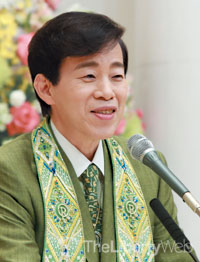The Power to Inspire People will bring about Economic Progress

Master Ryuho Okawa was born on July 7th, 1956 in Tokushima Prefecture, Japan. After graduating from the prestigious University of Tokyo, he joined a Tokyo-based international trading company. While working at the company’s New York headquarters, he studied finance at the Graduate Centre of the City University of New York.
On March 23rd, 1981, Master Okawa started communicating with the Spirit World and attained Great Enlightenment. He awakened to the fact that he is the rebirth of Shakyamuni Buddha and the core consciousness of El Cantare – the supreme God of the Earth. He established Happy Science in October 1986.
The year 2016 marks the 30th anniversary of the founding of Happy Science, with members in over 100 countries around the world, and many temple branches (shoja) all over Japan and in various other places worldwide.
He has published over 2,000 books, and many of them are bestsellers with millions of copies sold including The Laws of the Sun and The Happiness Realization Party. Furthermore, his books have been translated into 28 languages including English, German, French, Portuguese, Chinese and Korean to enable readers all over the world to receive his teachings. In 2014, he broke his own Guinness World Record of the Most Books Published In A Year (formerly 52 books), with 161 books published. He has given over 2,400 lectures, and has made 10 feature films as executive producer, including “Tenshi-ni I’m Fine” in cinemas all over Japan debuting on March 19, 2016.
In addition, he has established the Happiness Realization Party, Happy Science Academy, HS private school of politics, and Happy Science University (HSU).
I feel like I have experienced many small miracles throughout my life. From now on I would like to prompt greater miracles such as success in business management. Please tell us how to attain this.
(Excerpt from a lecture given on 19th September 2015, at Happy Science Tokyo Shoshinkan.)
Managing your goals is something to take note of in business management. Managing your goals does not mean simply maintaining the status quo. Taking the company Uniqlo, for instance, even this kind of large company has to decide how much increase in profit they want to make, and open new stores accordingly. The company president doesn’t have to go around each store to manage the sales, but what he does do is calculate how much each store has to sell in order to meet the total profit increase goal. New stores would be run in such a way as to meet these requirements. If you were to only set sales goals to exactly meet your past sales, these goals are set too low. This sort of goal management doesn’t bring about progress.
Good goal management is when you aim to make an effort for progress. On the other hand, goal management to maintain the status quo is no good, as this would just be the same as city council office work.
In the summer of 2015, a Japanese TV station aired a drama series named “Napoleon’s Village” about a government employee who revitalizes a rural village. In it, the protagonist says, “civil servants are useful people”. The public probably has a similar erroneous idea of government employees.
Just Meeting Necessities is Not Enough
There is a way of thinking that is needed for company employees and businessmen in order to survive in the future. In a time when things were scarce and economic progress was limited, things that answered the peoples’ necessities would sell. In other words, all you had to do was look for necessities in life, make and sell them. The coming age, however, will not work in this way.
For Japan’s economy, the GDP has been at around ¥500 trillion for the past 20 years. Seeing no growth for 20 years is a very rare thing. The central bank has introduced a negative interest rate policy, and interest rates in private banks are fairly close to nothing. The interest rates have been low for a long time now, but no one wants to invest in anything, and new businesses can’t grow. Such strange circumstances have been going on for 20 years, and it is obvious that something is missing.
It is the understanding that what commerce and industry had been doing until now, namely ‘trying to meet necessities’ is not enough to bring about economic progress.
In Japan, necessities have generally already been fulfilled. So now things have to go beyond that. Going beyond the old idea of ‘meeting necessities’, is to ‘provide a stimulating and heart touching experience to the customers’. Inspiring products and moving customer service will expand the market.
Japanese Economy Lacking in Inspiring Experiences
Taking Happy Science branches as an example, it is important for branches to do their best to inspire and move neighbors and visitors. It is true that reading our books and watching our videos can move these people, but you can also move people by talking to them. Our seminars can of course move the visitors. Whatever the shape, I would like you all to inspire, touch and move these people: especially aim to give a moving experience that leads to their spiritual awakening. If you do this, branches will really expand and flourish.
I think what the Japanese economy lacks is heart moving experiences. You, your job, and your company will make progress if you realize the importance of providing inspiring and touching experiences.
I repeat: keyword is “inspiring experiences”. Almost everyone has his or her necessities already met. There needs to be something above and beyond mere necessities. Even at Happy Science branches, I would really like you to come together and think about how you can provide inspiring and moving experiences. This is of utmost importance.
And if a candidate from our political party [the Happiness Realization Party] comes to visit, I would like everyone to gather and think about how this candidate can provide such an experience when he or she stands as a representative. Please think about how that candidate’s special qualities and introductory mannerisms can move the public. These inspiring and moving experiences are things that the world is really starting to need.
Provide a New Kind of Inspiring Experience through Consideration and Effort
Today I coordinated my clothing with the color green so that I can inspire and move the audience. Did you notice? (Audience applause) I chose to do so because I expected it to be sunny [which it was]; it wouldn’t have worked if it were pouring rain. This is one example of consideration and effort that is needed to provide a moving experience.
The outside of my jacket is green today, but the inner lining is also green. (Audience laughs). I occasionally flash the inner lining for the women to notice, but usually it is something that wouldn’t be seen. Regardless, your thoughts of providing a moving experience have to extend to these hidden places. These subtle things make people think “I want to come to Tokyo Shoshinkan again” and “I want to come even from far away Hakata!” Making people think “his clothes won’t be green next time. I wonder what he’ll choose” is another sort of inspiring experience.
I gave a very simple example, but there are many different religions and many ways of inviting people and actions. It is important to constantly think about what will bring people an inspiring and touching experience, and what will bring them joy and happiness. People notice these fresh new approaches, so it would be fantastic if you keep those keywords in mind.


![Introduction to Top Executive Management: How to Turn Every Opportunity into Success [Paperback] by Ryuho Okawa/Buy from amazon.com](/files/2016/03/160407_amazon.jpg)

















